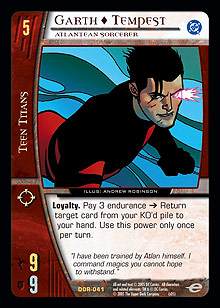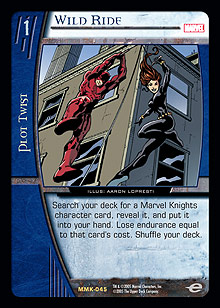There have been several changes of late that make a strong Hobby League very desirable for your Vs. System community. Over the years, a lot has changed in my local scene. In the beginning, everyone played the casual game and collected rares. A choice few ventured out of local hobby shops and off their back porches to catch Qualifier Tournaments or to play tournaments for boxes of cards.
There were several guys who loved comics and played card games. Half a dozen of these guys bought a bunch of boxes and started a backyard league. There was a large pile of new cards on the comic store table, and my shoes were covered in shiny foil the afternoon I met them. We became fast friends and made a “playdate” in the backyard arena.
 After most people settled down for a good night’s rest, we popped the tops off our aluminum card containers, shuffled the assorted plastic sleeves, and threw our dice onto tables as a symbolic start to our twilight battles. In those days, people were crafting the first versions of Big Brotherhood, we all loved Avalon Space Station, and Relocation was an essential part of any deck. My wife sported a new type of Teen Titans build with Garth ◊ Tempest, and I slipped an 8-drop Apocalypse into my multiplayer build for some late game domination.
After most people settled down for a good night’s rest, we popped the tops off our aluminum card containers, shuffled the assorted plastic sleeves, and threw our dice onto tables as a symbolic start to our twilight battles. In those days, people were crafting the first versions of Big Brotherhood, we all loved Avalon Space Station, and Relocation was an essential part of any deck. My wife sported a new type of Teen Titans build with Garth ◊ Tempest, and I slipped an 8-drop Apocalypse into my multiplayer build for some late game domination.
We typically drank icy beverages and flipped cards until sunrise. Over time, we improved our setup by getting a suitable play table that accommodated eight players and their decks. The back porch was screened, shielding us from mosquitoes and other bug life. A plug-in fan circulated the dense Florida air, and occassionaly we could detect the distant mating grunts of alligators across the lake.
Our play sessions ran from about ten at night until six in the morning. We were dedicated. We were tired. In the end, we were obsessed with this new game. The player base grew, and with added diversity came new ideas and an increased card pool. Card acquisition improved with trading, and the senior players supported the newer ones with deck ideas, common cards, and the occassional janky rare.
When Web of Spider-Man was released, we ordered boxes from our local shops and played some Sealed Pack. A week later, I received a cursory introduction to the Draft format. It turned out that 7-drops ruled, and there were only a couple of teams to play. Things always seemed so simple in the good old days. Among my fond memories are the friends that I met and the new love for some now-classic cards that was born in the middle of those weekend nights.
From the Backyard to the Comic Shop
There is only a certain amount of time that a guy’s wife is going to tolerate a bunch of rowdy gamers playing cards when the rest of the world is sleeping. My good buddy had a wife whose patience lasted longer than most. After a couple of months, our group outnumbered the chairs. Rather than keeping the neighbors diligently informed of our attack declarations and playing cards while sitting on each other’s laps, we made the transition to a local comic shop. We met with the owner, had conversations with a few employees at the store, and negotiated a regular play night.
After we proved our dedication and made sure to frequently buy product from the store, we found a little reciprocity. The shop began carrying singles, and stocked  every Vs. pack that we could ever want. We landed special orders when our niche products were hitting the market, and occasionally someone outside of our original group would come in and catch a few games.
every Vs. pack that we could ever want. We landed special orders when our niche products were hitting the market, and occasionally someone outside of our original group would come in and catch a few games.
Months passed. Some of the regulars brought their friends, we introduced new players to the game, and rookie players rose through the ranks. There were graduate students and pizza makers, lawyers and construction workers, and players ranging in age from 15 to 50 years old. Our Hobby League really hit its stride when the store owner purchased the materials from UDE. Along with store credit and pack prizes, we began competing for the Extended Art foils. I can remember winning my first Hobby League EA. In the beginning, one could scoop up copies of all the best X-Men, but when Marvel Knights first hit, UDE began offering bomb rares like Wild Ride and some of the most playable commons and uncommons.
Tips and Pitfalls to Avoid
If you want to set up a thriving Hobby League, there are several things you should try and several things you should try to avoid:
Pay where you play.
Support the store that supports the Hobby League and provides your play space. In the beginning of the game, I tried to get all of the cheapest boxes from the Internet, and perused eBay for the most inexpensive cards. I still do. Nevertheless, there is a sort of paradox built into the trading card game market: A game is most fun when you have both a place to play and a lot of people with which to play, but these are harder to come by if you obtain your cards in the cheapest manner.
Let me present two scenarios. In our first scenario, there is a player who goes to the local comic shop or game store. That player plays cards with his or her buddies and spends hours working through deck ideas, sitting in potential retail space, and piloting a decklist through Hobby League peril. That player understands that there is a certain implicit need to support the store for providing the opportunity to play the game, the space, and advertising for the League, so he makes sure to spend a couple of dollars on packs, dice, and sleeves as a sort of reciprocal support. I love shops that provide singles in either a binder or a display case; I would gladly pay two or three dollars more for a card that I need rather than wait for it to come in the mail. There is something to be said for a little immediate gratification. In the end, both the store and the players are winners.
In a second scenario, you have a player who attends tournaments and Hobby League, but exclusively buys boxes and cards from the cheapest possible place on the Internet. If enough players do this, it may create less incentive for the store owner to support the game.
Both casual players and tournament players are part of the TCG ecosystem. Stores provide space for Hobby League so they can sell product and fund the business, while players must consume product to ensure support and space for their game. If either side does not contribute in an equitable or meaningful way, the balance may be lost.
Love thy neighbor.
Card players are a rather competitive group. They like to compete with their collections and with their decks. I think most players really like to win; however, it may be useful to consider the needs of all players that attend your local tournaments.
Again, I will present two scenarios. In our first instance, we have a player who has been in the game for two years. This player may or may not have been to a Pro Circuit, has a good grip on the rules, has a solid card base, and knows about the various formats in Vs. System. A new player walks in the door. He has heard about the game, loves him some super heroes, and wants to start playing in the regular Friday night scene. The senior player understands that new players can add a great deal to a tournament scene; however, learning the rules, collecting the cards, and understanding all of the formats is a daunting task for the new player. In turn, the more experienced player establishes a mentor-esque relationship with the new player by offering him support in learning the rules, throwing him some cards for his collection, and making sure to include him in casual games and conversation. The new player sticks around, buys more cards, supports the store, brings friends into the game, and eventually becomes a mentor to other new players.
In a second scenario, a new player swims into the established tournament scene with old sharks. The more established players bring their best decks and crush any new competition. (Win at all costs!) Further, they set up some beneficial trades in which the new player loses all of his money cards in trades for less playable materials. The new player does not get a chance to win, does not build his collection, and quits coming to the League. After several months of four or five regulars playing each other constantly, the lack of new blood results in a stale environment, and one of the sharks moves on. Two of the other players stop coming, and the foresight-lacking established players nail shut the coffin on their beloved League.
Like the ecosystem between the player and the store, there is a certain responsibility shouldered by established players to protect the welfare of the players entering the game. Winning is fun, and getting great deals in a trade is excellent, but not at the cost of killing the local scene.
Some Notes on Personal Responsibility
I have played this game for a number of years, and have personally witnessed each of the situations outlined in the aforementioned scenarios. Unfortunately, I may have been a catalyst for negative change. I am now, however, shouldering my responsibility as a player for the conditions and welfare of my local gaming scene. There is a significant group of players making a similar transition. Some of them are pro players and some of them are casual, but they are all taking steps to “grow the game.”
After we implemented some of the best practices in this article, our weekly tournaments grew. We are collecting many new faces and attracting some of the older players who had long gone. The turnaround came at the simple cost of a little store support and a little more respect between players. As you make your decklists this week and head off to Hobby League, you may want to try implementing some of these ideas. They will not only work out—they will also pay huge dividends.
If you do not currently have a Hobby League, make an action plan. Gain the buy-in of some key personalities—including a solid player base, the store owner, and employees—and set up a regular night to play. It will be fun, and you will end up becoming a better player in the process!
Jeremy Blair is a competitive and casual card player from Florida. He is a member of Team Alternate Win Condition and can currently be found flipping cards every Friday night in Tampa. E-mail critiques, questions, and comments to Tampakingpin@yahoo.com.